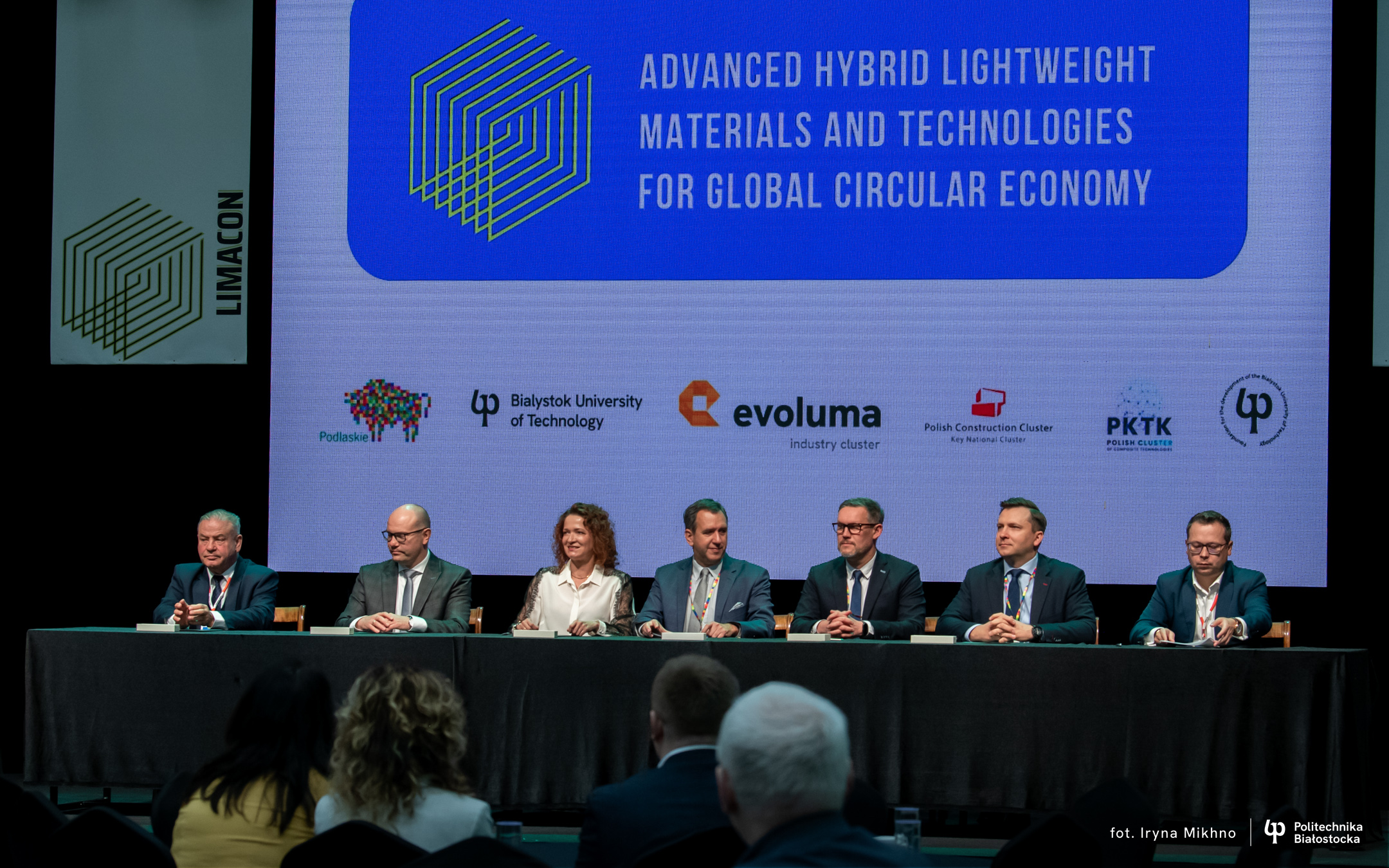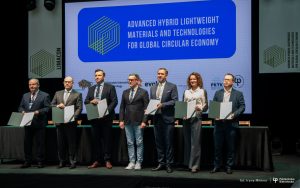Open Innovation Network of Podlaskie Region
13-11-2023
“Advanced hybrid lightweight materials and technologies for global circular economy” is a three-day international conference on hybrid materials, composites, lightweight structures and the circular economy. During the conference, the Open Innovation Network of the Podlaskie Region was established. The event marked the beginning of a new phase of cooperation between the University, the Podlaskie Region Board, as well as Polish and foreign industry representatives and scientific centers.
Raising awareness of new trends in the economy, working to promote the achievements of Podlasie universities and companies – these, among others, are the goals of the Open Innovation Network of Podlaskie Region, established during the conference.
– The establishment of the Open Innovation Network of Podlaskie Region is a formalization of our long-standing cooperation,” says Assoc. Prof. Marta Kosior-Kazberuk, DSc, PhD, Eng., Rector of the Bialystok University of Technology. – Stabilizing and strengthening the cooperation and involvement of more partners is a great step towards forming a long-term systemic framework for the Bialystok University of Technology’s cooperation with numerous industrial and foreign partners. It is like the realization of the idea of Triple or Quadruple Helix.
The formalization of cooperation, which has actually been in place for several years, will allow, among other things, the preparation of projects within the framework of Horizon Europe – the Community’s largest ever European research and innovation program, with a seven-year (2021-2027) budget of 95.5 billion euros.
– We always join this kind of projects to develop us and make our knowledge grow as a region and all institutions such as universities – such as the Bialystok University of Technology,” stresses Dr. Artur Kosicki, Marshal of the Podlaskie Region. – The point is to support each other logistically and financially, because this allows us to use European funds, and we as a local government also have the possibility to mobilize funds from the provincial budget. Bialystok University of Technology, in turn, has great potential and extensive contacts. This is what it is all about: we are supposed to complement each other.
The primary goal of the projects implemented through the Open Innovation Network of Podlaskie Region will be to attract investors to Podlaskie, to establish international cooperation.
– This conference is extremely important to us because it is part of what the Office of Investor Assistance and Economic Promotion of the Podlaskie Region Marshal’s Office does,” says Dr. Mariusz Dabrowski, Director of the Office. – We want to internationalize the province both in terms of business but also in terms of science. We support Podlaskie universities so that they can showcase themselves in Europe.
This was also the goal of the organizers of the conference from Bialystok University of Technology.
– The aim of the conference is to bring business and science together, to allow scientists to get acquainted with companies operating in Podlaskie, but also in Poland and abroad, informs Izabela Zgłobicka, DSc, PhD, Eng., chairwoman of the conference organizing committee. – We have received guests from Germany, Estonia, Greece, Lithuania, Latvia and Sweden. We want to learn about the possibility of joint research and activities that commercialize the results of scientists’ work.
One of the most important topics discussed at the conference is the ubiquity of composite materials and their importance in the modern economy.
– Composite materials are the future of construction,” reminds Assoc. Prof. Marta Kosior-Kazberuk, DSc, PhD, Eng.
The rector of the Bialystok University of Technology, among other things, researches the use of composite reinforcement in concrete structures in her scientific work.
– We are constantly looking for materials that will be less costly, less energy-consuming, people-friendly, environmentally friendly, and such opportunities are provided by materials engineering and the construction industry is eager to take advantage of these opportunities using dedicated materials,” emphasizes Assoc. Prof. Marta Kosior-Kazberuk, DSc, PhD, Eng. – At our University, we are doing extensive research on geopolymers or the use of non-metallic types of reinforcement for concrete structures. These are all composite materials. Concrete itself is a composite material, and we are looking for more and more new solutions in this area using new additives new recycled materials. It can be said that construction stands with composite materials.
Composite materials represent a development opportunity for countries without their own resources of natural resources.
– Since Lithuania does not have many natural resources, composite or biocomposite materials can significantly shorten supply chains and allow greater independence from natural resources, says Andrius Vilkauskas, PhD (Kaunas University of Technology) – This is the future of our industry.
Modern materials can affect the well-being of the entire world.
– Technology transformation is crucial for climate action and for the industry, because it means making it more resistant to imports of militarily important materials from certain countries, says Werner Loscheider of the Federal Ministry of Economic Affairs and Climate Action from Germany. – We can reduce greenhouse gas emissions so cooperation in Europe is another key initiative for us. We hope that Poland will join our initiative and the European network of such plants.
An important element of the conference is the introduction of a closed loop economy.
– In Sweden, we are very focused on the closed loop economy,” says Cecilia Ramberg, Director of LIGHTer, Sweden’s strategic research and innovation program for lightweight materials. – It’s important that not only do we have a resource-efficient solution in which we use as little energy and materials as possible, but that the solutions we introduce allow for a closed loop. It’s important to solve such problems from a European perspective.
The conference was organized by the Bialystok University of Technology with the support of the Marshal’s Office of the Podlaskie Voivodeship as a Strategic Partner with the participation of three key clusters – the Polish Construction Cluster, the Evoluma Industrial Cluster and the Polish Composite Technology Cluster with the support of the Foundation for the Development of the Bialystok University of Technology.
– DemoLab, which was prepared by the Evoluma Industrial Cluster earlier Metal Processing Cluster was located at the Faculty of Mechanical Engineering of Bialystok University of Technology, while it is aimed both at all students of Bialystok University of Technology and employees of the business environment, reports Sebastian Rynkiewicz, President of Evoluma Industrial Cluster. – DemoLab is for people who want to improve their competence in robotics, automation, numerically controlled machine tools, elements related to Industry 4.0, that is, what is the latest in technology. We want to put the human being at the center and focus on him in the face of technology, that is, we are already entering the prospects of industry even 5.0.
Entrepreneurs in the key clusters appreciate the opportunity to promote the use of hybrid materials, composite materials, or lightweight structures in business.
– Entrepreneurs from the construction cluster cooperate with Bialystok University of Technology on an ongoing basis in various research and development projects desire,” says Mariusz Wasilewski, director of the Polish Construction Cluster. – However, not everyone yet knows exactly what kind of help Bialystok Technical University can use on a daily basis. This conference serves to connect business and science. I hope that these two days will show entrepreneurs that it’s possible, that it’s not that expensive, you just have to want it.
